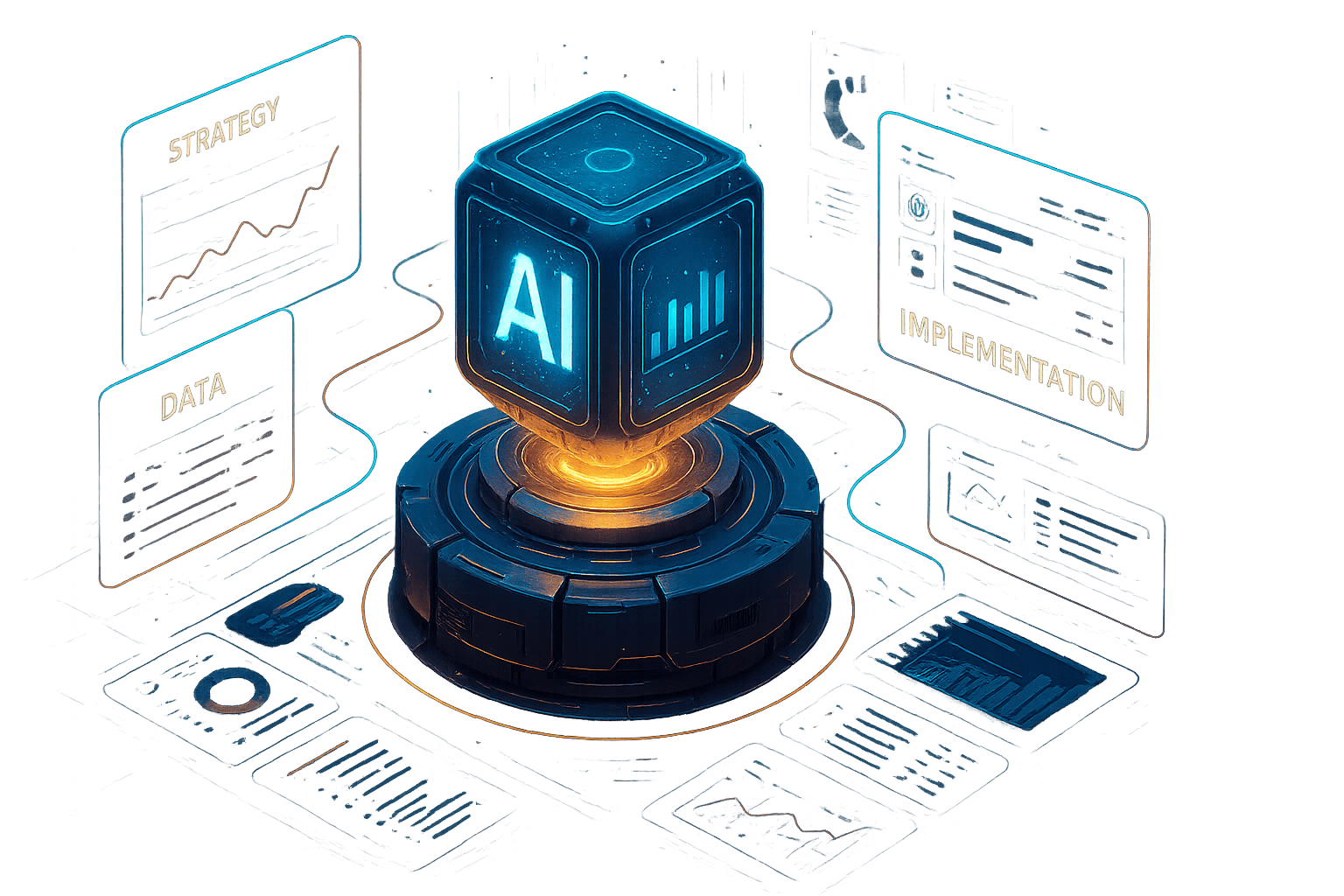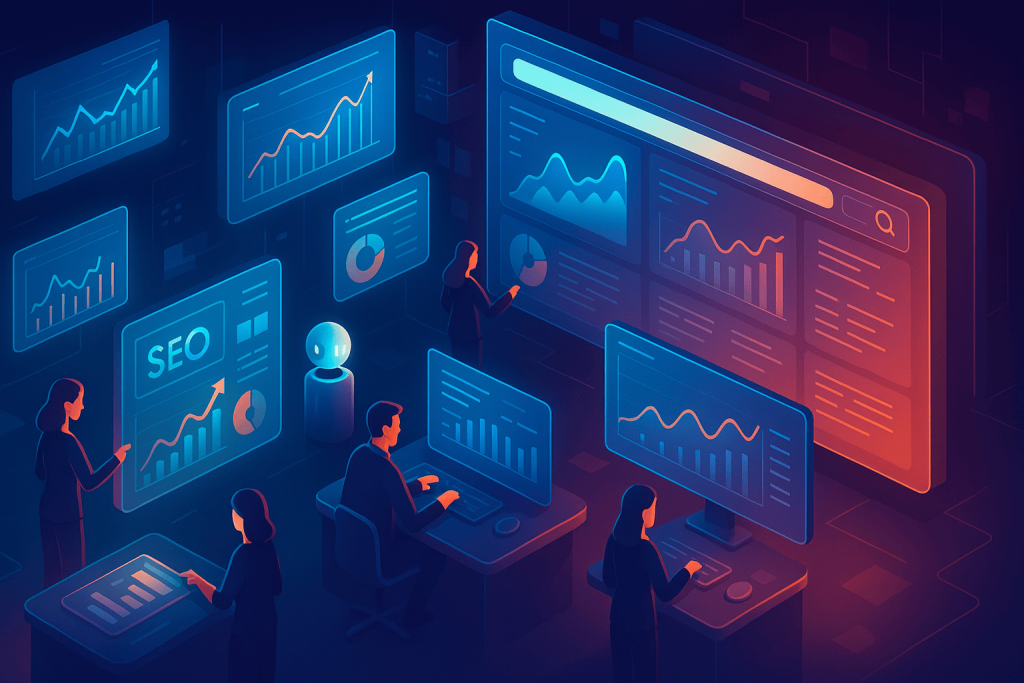AI SEO Agency Services: What Small Businesses Should Expect in 2025

What is an AI SEO Agency?
An AI SEO agency specializes in making your business visible where people are actually searching – not just Google’s traditional results, but AI-powered platforms like ChatGPT, Google’s AI Overviews, Perplexity, and voice assistants.
Think about it this way: when someone asks ChatGPT “best family restaurant near downtown,” you want your restaurant mentioned in that answer. When they ask Siri for a roofing contractor, you want to be the recommendation.
Traditional SEO focuses on ranking your website pages. AI SEO focuses on getting your business mentioned directly in AI-generated responses. It’s the difference between hoping someone clicks through to your site and having AI assistants recommend you by name.
- Getting AI models to understand what your business does
- Ensuring you appear when AI systems answer relevant questions
- Building the kind of online presence that AI systems trust and cite
AI SEO vs Traditional SEO Agencies
Traditional SEO isn’t dead, but it’s not enough anymore. Here’s what’s different:
- Ranking pages in Google search results
- Building backlinks and domain authority
- Optimizing for specific keywords
- Technical website improvements
- Getting mentioned in AI-generated answers
- Creating content that AI systems can easily understand and quote
- Building citations across multiple platforms (not just your website)
- Optimizing for conversational, voice-style queries
The content approach is completely different too. Traditional SEO content is written for search engines. AI SEO content is written for AI systems to understand and reference.
Instead of keyword-stuffed pages, you need clear, factual information that AI can confidently cite. Instead of just optimizing your website, you need consistent information across review sites, directories, social media, and news mentions.
The biggest difference? Traditional SEO is about getting clicks. AI SEO is about getting recommendations.
Key Services Offered by AI SEO Agencies
LLM Audits and Visibility Assessments
The first thing any good AI SEO agency should do is test where you currently stand. They’ll ask ChatGPT, Claude, Perplexity, and other AI systems questions like:
- “What is [your business name]?”
- “Best [your service] in [your city]”
- “Tell me about [your industry] companies in [location]”
This audit reveals whether AI systems know you exist, how they describe your business, and which competitors they mention instead of you.
Most small businesses are shocked by these results. Businesses with great Google rankings often get zero mentions in AI responses.
AI-Ready Content Creation
AI systems need structured, clear information to cite your business. This means:
Question-Based Content: Instead of “Our Services,” you create pages like “What HVAC Services Do We Offer?” with direct answers.
FAQ Sections: AI systems love pulling from well-organized FAQ content.
Structured Data: Technical markup that helps AI understand your content context.
Citation-Friendly Formats: Information presented in ways AI can easily quote or summarize.
Local Pack Optimization for AI Search
Local businesses need special attention because AI assistants handle location-based queries differently than Google.
This includes:
- Optimizing Google Business Profile for AI visibility
- Ensuring consistent business information across all platforms
- Creating location-specific content that AI systems can reference
- Building local citations that AI models trust
Automation and Monitoring
AI models update constantly. What works today might not work next month. Good agencies use tools to:
- Track how often your business appears in AI responses
- Monitor which competitors get mentioned instead
- Test new query variations regularly
- Adjust strategies based on AI model updates
Digital PR for AI Citations
AI systems pull information from across the web – news articles, industry blogs, review sites, directories. Agencies help build authoritative mentions by:
- Getting you quoted in industry publications
- Publishing original research or data
- Creating linkable resources other sites reference
- Building relationships with local news outlets
Pricing Models Explained
- Basic AI visibility audit
- Local optimization
- Simple content restructuring
- Monthly monitoring
- Comprehensive AI optimization
- Content creation and restructuring
- Citation building campaigns
- Bi-weekly strategy adjustments
- Advanced AI strategies
- Original research and PR
- Multi-platform optimization
- Weekly performance tracking
Most agencies offer four pricing structures:
- Monthly Retainers (most common): Predictable monthly fee for ongoing services
- Project-Based: One-time audit and optimization ($1,000-$5,000)
- Hourly Consulting: $75-$200/hour for specific tasks
- Performance-Based: Pay based on results (less common, higher risk)
Here’s what I’d recommend: Start with a project-based audit to see where you stand. If the results show real opportunity, move to a monthly retainer. Avoid performance-based pricing – it often leads to quick fixes instead of sustainable growth.
How Swift AI SEO Works
Since most AI SEO is still new territory, let me walk you through what a good process looks like:
Step 1: The Reality Check Audit
We test your current AI visibility across major platforms. I'm not talking about vanity metrics – I mean real queries your customers ask.
For an HVAC company, we test queries like:
- "HVAC repair companies near me"
- "Who can fix my AC today?"
- "Best heating contractors in [city]"
For a law firm:
- "Estate planning attorneys in [city]"
- "Who helps with probate issues?"
- "Best lawyers for wills and trusts"
This audit shows exactly where you stand and identifies the biggest opportunities.
Step 2: Content Restructuring
Most business websites are built for humans browsing, not AI systems parsing information. We reorganize your content into formats AI can easily understand and cite.
This means turning your generic service pages into question-based content that directly answers what customers ask AI assistants.
Step 3: Local Optimization
For local businesses, we optimize your Google Business Profile and ensure consistent information across directories. But we go deeper – creating location-specific content and building local citations that AI systems trust.
Step 4: Citation Building
We identify the types of sources AI systems cite in your industry and build authoritative mentions across those platforms. This might include industry directories, local news sites, or niche publications.
Step 5: Ongoing Monitoring
AI systems change constantly. We track your visibility monthly and adjust strategies based on what's working.
The whole process typically takes 2-3 months to show meaningful results, with ongoing optimization after that.
Don't get burned by agencies selling outdated services with AI buzzwords slapped on top. Ask these questions:
Our proven process gets you AI-search ready in days, not months.
How do you actually test AI visibility?
They should describe a specific process for testing queries across multiple AI platforms, not just talking about it theoretically.

What AI tools do you use?
Look for specific tools for testing, monitoring, and optimization. Generic answers are red flags.
Can you show me examples of businesses you've helped appear in AI responses?
Real examples, not just case studies about traditional SEO improvements.
How do you handle local optimization for AI search?
They should understand that local AI optimization is different from traditional local SEO.
What's your reporting process?
You want regular updates on AI visibility, not just traditional ranking reports.
How quickly do you adapt to AI model updates?
AI systems update frequently. Agencies should have processes for staying current.
What happens if this doesn't work?
Understand their refund or adjustment policies upfront.
The Small Business Reality
Here’s what most articles won’t tell you: AI SEO is still experimental. Anyone claiming guaranteed results is lying.
But here’s what we’ve seen work consistently:
Start small. Get an audit to understand your current situation. Don’t commit to huge retainers until you see what’s possible.
Focus on local first. If you’re a local business, local AI visibility should be your priority. It’s easier to win and more valuable for most small businesses.
Think long-term. This isn’t a quick fix. Building AI visibility takes time, just like traditional SEO used to.
Don’t abandon traditional SEO. You need both. AI SEO supplements traditional SEO, it doesn’t replace it.
The businesses winning at AI SEO right now are the ones that started early and stayed consistent. They’re not necessarily the biggest or best-funded – they’re the ones who adapted first.
What's Next?
AI search isn’t coming – it’s here. Your customers are already using it, whether you’re optimized for it or not.
The question isn’t whether you need AI SEO. The question is whether you want to be ahead of this curve or behind it.
The early movers in AI SEO are already seeing results. The longer you wait, the harder it gets to catch up.
Ready to future-proof your business? Let’s talk.


